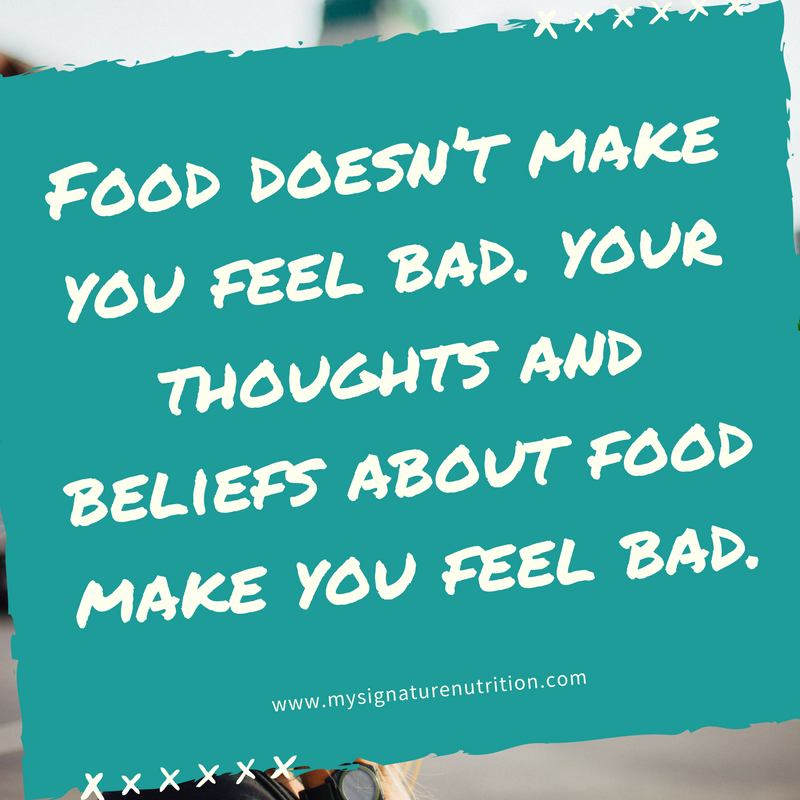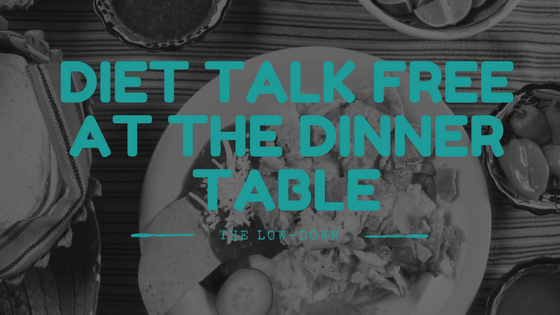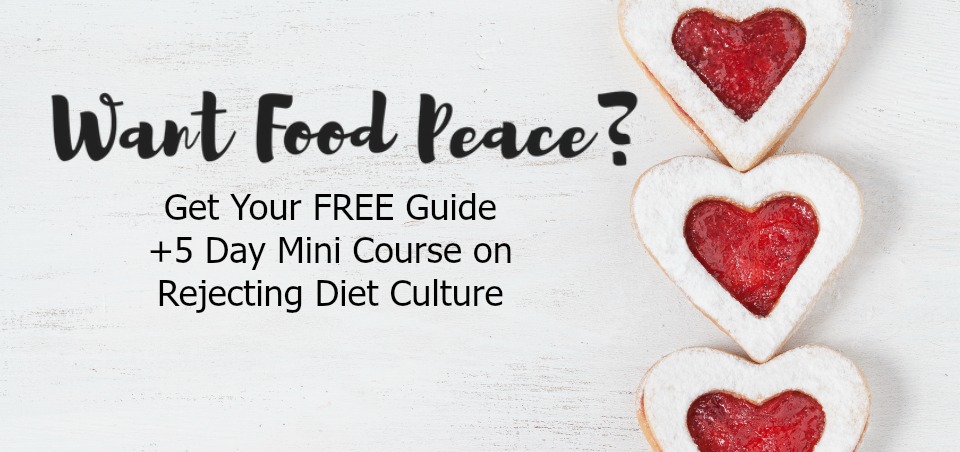Diet Talk Free At The Dinner Table
November 15th, 2017 by Sara Upson
When you live in diet culture it can be really hard to get away from diet talk. You can work to separate yourself from diet culture but you cannot make anyone else stop. It’s like that saying- you can lead a horse to water but you can’t make them drink. You can share all that you know about diet culture and how amazing it is to be free but you can’t make some one else ditch diet culture. (Trust me, most people in my family are still stuck in diet culture.) And even worse, sometimes people think they’re free from diet culture- totally separate but don’t understand and don’t get it. They still make diet culture comments and focus on weight.
One of the most difficult times for anyone living in diet culture is this time of the year around the holidays. There’s so much focus on celebration and food. It’s a fun, exciting time of the year, but with diet culture it’s also…empty. It’s like everything that you do or that your friends or loved ones do has to be justified.
- Oh, I’m being so bad but I’m starting a diet in January.
- I shouldn’t have had that but I’ll exercise later to make up for it.
- My grandmother used to make these cookies they make me think of her, but now I’ll need to eat clean for the rest of the week.
- Oh this is delicious but but but…
The simple enjoyment and pleasure of food is gone. Permission to eat is gone. And certainly the permission to eat enjoyable food is gone. That’s not a good thing. When you don’t have permission to eat enjoyable food, you then feel the need to rationalize your eating with every bite. Hence why diet culture talk is so common at thanksgiving and holidays! When there’s no satisfaction with eating, this drives overeating and body disconnection. When you don’t have permission to eat enjoyable food, then you feel guilty all the time. When you feel guilty about your body or eating all the time then you have to focus on diet talk to feel better about what you’re doing. It’s a cycle that then drives you right back to overeating. On the other hand, permission and satisfaction with eating leads to eating less because you’re done and you don’t need more. Your stomach sends a message to your brain that says I’m satisfied. Your mind stops thinking about food all the time, you don’t need to justify your eating, you can focus on other things, and you’re not stuck in diet culture. It’s powerful!
Unfortunately, instead of permission and satisfaction diet culture focuses on right and wrong. Whenever there is any sense of wrong diet culture creates the need to rationalize, justify, and call out the guilt and shame- as if proclaiming how bad you’re being with your eating corrects the wrong. All this does is further immerse you in diet culture. It validates that what you did was “bad” and needed to be confessed. But here’s the truth: Food doesn’t make you feel bad, your thoughts and beliefs about food make you feel bad. Food is innocent. It’s just food. So this year, help everyone around you have a more satisfying holiday. Support those struggling with disordered eating and break free from diet culture by denouncing diet talk and creating a diet talk free dinner table. Here’s how:
Whenever there is any sense of wrong diet culture creates the need to rationalize, justify, and call out the guilt and shame- as if proclaiming how bad you’re being with your eating corrects the wrong. All this does is further immerse you in diet culture. It validates that what you did was “bad” and needed to be confessed. But here’s the truth: Food doesn’t make you feel bad, your thoughts and beliefs about food make you feel bad. Food is innocent. It’s just food. So this year, help everyone around you have a more satisfying holiday. Support those struggling with disordered eating and break free from diet culture by denouncing diet talk and creating a diet talk free dinner table. Here’s how:
1. Declare it Diet Talk Free by Making it Mindful- let others know
“This year I really want to focus on creating a mindful eating experience. This means that talking about eating in terms of good, bad, clean, healthy, unhealthy, guilty or innocent isn’t allowed at the dinner table.” Feel free to use these words though: delicious, yummy, scrumptious, Mmmmmm, tasty, satisfying, like a baby angel (someone told my husband that once after taking a sip of a flavored latte, who even knows what they were talking about but it’s a great way to describe yummy). And food doesn’t always have to taste pleasant it could also be bland, dry, gross, yucky, inedible, disgusting, or awful. The focus is on being mindful and experiencing how the food tastes, how you physically feel, not on diet culture beliefs and food rules.
2. No Negative Body Talk
Again we can’t control what others say but you can be aware of what you say and how you respond to others comments. This is particularly important with negative talk. Negative body talk is an ingrained part of diet culture that focuses on body shame. It’s insidious and happens so often that most people aren’t even aware of it:
- You look great have you lost weight?
- I wish I could wear that but my stomach is so big.
- I’d wear such cute clothes if I had your body.
- It looks like you’ve gained weight this year.
- I love that shirt on you- oh thanks, I just feel like it makes my arms look big…
- I hate my (fill in the blank)
Negative body talk focuses on bonding over body dislike. This talk only makes you feel worse and always focuses on weight loss as the solution. That if you could just be smaller then you would be happy. Wrong. It just makes you feel bad, more likely to be a disconnected eater, makes body image worse, increases food thoughts and focus. And if you use food for comfort you’re more likely to find yourself eating more. (Which, to be clear, comfort eating isn’t a bad thing. It can be an effective coping skill, however you may not want it to be your only coping skill.)
3. Compassion
When someone around you is rationalizing their eating, negative body talking (about themselves or someone else) what it really says is that they don’t feel good. That their worth is tied to what they look like and how they eat. That they don’t have permission to eat and that they feel guilt and shame and need to announce it to everyone else. So when you’re aware of diet culture and hate what others are saying, even feel triggered. Try to have some compassion (it’s okay if you’re not there yet). They’re still trapped. Afraid. Scared. Feel like there’s no other option. Can’t see that they’re miserable and that their worth is tied to their body. That’s an awful place to be.
4. Be Prepared
Again, you can’t control what others say but here’s some ideas on how to respond and change the conversation at the table.
Ways to shift the focus off of diet culture:
- Plan ahead with conversation topics: weather, sports, traffic, entertainment (movies and tv shows), books, hobbies, Christmas wishes, what you’re thankful for, holiday traditions, kids, traveling, vacations, pets.
- Build in diversions– Plan games. Hide surprises at the table. Use conversation cards at each seat.
- Change the conversation:
- So anyways…
- Anywho
- Say excuse me and leave
- Ask a question about something else
- Talk Back
- You look great, have you lost weight:
- Does it matter?
- I’m just living life.
- What does weight have to do with it.
- Was that supposed to be a compliment?
- Have you gained weight?
- Does it matter?
- Yes, I feel so much better.
- I’m healthier.
- I don’t know I don’t follow that anymore.
- I’m starting a diet soon (or something in the restrictive sense).
- Diets don’t work.
- Did you want to think about food more?
- My brain likes to be fueled.
- I don’t like being hangry.
- So you want to feel worse about yourself.
- I hate my body or I’m so fat.
- I wonder what you’re really feeling.
- Are you worried about something?
- Now you owe yourself 5 compliments
- Comments like that hurt other people as well as yourself.
- Let’s talk about more important things.
- Yeah, I’m the wrong person to talk to about that.
- You might want to talk to a trained professional about that.
- Negative body talk just makes you feel worse, not better.
- You look great, have you lost weight:
Want this printed? Click here for the FREE diet culture free dinner guide.
Want to reject diet culture completely? Get my free guide + mini course.








Leave a Reply